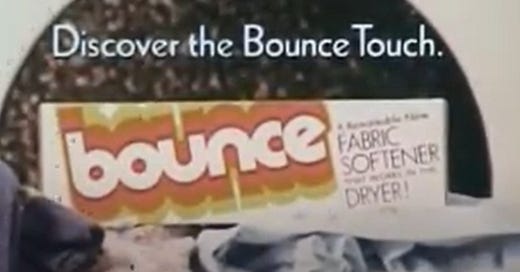Last week, my mom taught me that we don’t need dryer sheets.
Those big reusable wool dryer balls remove the static from our clothes just fine as they tumble round. Other than being unnecessary, dryer sheets can damage our clothes and drying machines over time because of the thin waxy film they leave behind.1
Then she mentioned how laundry companies also tell us how much soap to use. The caps on big jugs of detergent have a Fill line to indicate how much soap you should add to the washing machine. I always used that much without questioning it. “But we don’t need that much,” she continued. “They want us to use more than we need so we burn through soap quickly and come back to buy more.”
With these two seemingly small revelations, I was exposed to my own naïveté.
I wasn’t asking enough questions. I had foolishly never even thought about asking those questions. I trusted the word of companies who profit from those who follow their labels without hesitation. When companies make decisions for us, we should question them ruthlessly. And that which we have never thought about questioning is what we most need to question.
~~~
Most companies don’t care about the individual consumer.
I’m part of a target consumer, an archetype defined by demographics, that buys or that they want to buy their stuff. So are you. The impact their product has on our health, wallet, or world is not of concern. As long as it adds to their bottom line, it’s a good product.2
Food companies regularly sub out ingredients in their products for cheaper but worse alternatives.
Palm oil is dirt cheap. It’s flavourless and colourless once refined. Its production can be ecologically disastrous, leading to deforestation and other environmental implications. And if you’re concerned for your health, you probably want to avoid consuming much of it.
Yet it finds its way into both our cosmetic and food products.
It’s in our soap, deodorant, sunscreen, and about half of the packaged products in grocery stores. And it’s often secretly masqueraded on packaging as one of its derivatives: Vitamin A palmitate, Palmitoyl tetrapeptide-3, Glycerin, Cocamidopropyl betaine, Stearic acid, Palmate, Palm kernel oil, Magnesium stearate, Sucrose oleate, Sodium palm kernelate, Sodium lauryl sulfate, Decyl glucoside.3
So even if you’re trying to avoid palm oil, you’ll have a tough time figuring out which of your products it’s in.
~~~
It’s easy to slip through life without asking questions of the regular everyday things that happen right under your nose.
I’m trying to pay more attention. Examine all of the things I engage with regularly, whether it be a product I buy or a service I use, and ask more questions of them. And when it makes sense, I’m finding my own way rather than following convention.
Baking bread at home rather than buying the crap in stores that’s pumped with oils and additives.
Passing up on dryer sheets and figuring out how much soap I actually need to add to the washing machine.
Doubting if the positive health impact of AG1 is as substantial as every paid podcaster says it is and just eating vegetables instead.
Asking more questions where I’ve never asked questions before, trusting myself more than big companies and bought-off influencers, and walking the path that makes sense to me rather than the one I’m being told to walk.
With love,
Subscribe for new essays every Thursday:
Thanks for reading!
1 — Leave a like. I’d be grateful if you’d consider tapping the “heart” ❤️ at the top or bottom of this page.
2 — Let’s chat. If this resonates or you want to share your thoughts, please leave a comment on this post. I’d love to hear from you and I respond to everyone!
3 — Share the love. If you know someone who may enjoy reading this, please share it with them.
P.S. If you want to reach me directly, you can respond to this email or message me on Substack Chat.
This is not to say that capitalism is bad. It seems to be the best system we have been able to create. And I invest in S&P500 companies so I am hypocritical in that I benefit from corporations hauling in big bottom lines.







The whole piece was worth it just to read this line: "Doubting if the positive health impact of AG1 is as substantial as every paid podcaster says it is and just eating vegetables instead." For sure will go down as one of the greatest marketing ploys of all time. Not saying it's bad, but I'd wager almost all I own that eating an organic cucumber and some wild strawberries does 10x more for the body and soul than a pack of that powder.
The point on palm oil and the ways it is hidden is especially good.